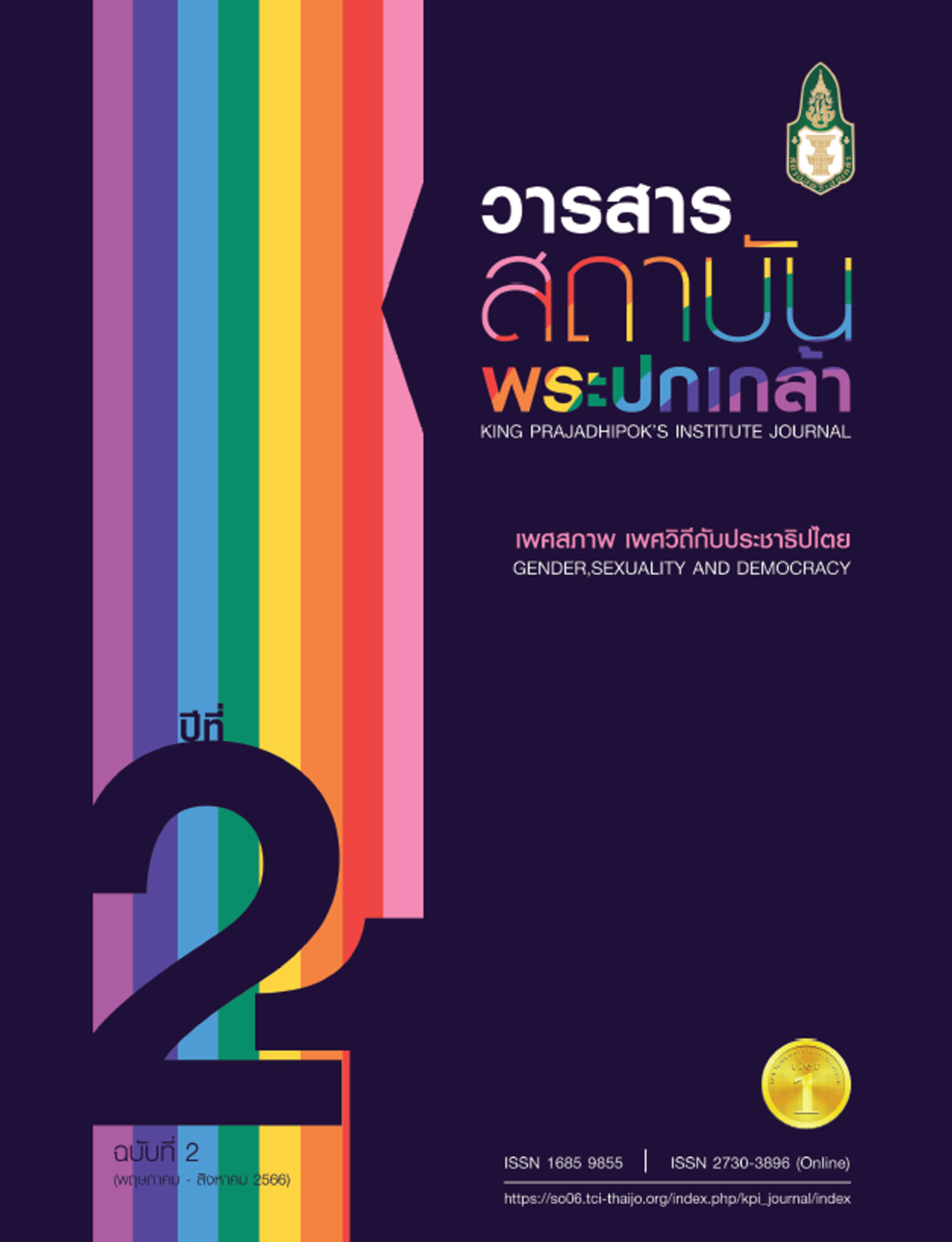Gender Perspectives and the Missing Voices in LGBTIQ+ within the Peacebuilding Process in the Southern Border Provinces
Main Article Content
Abstract
The UN's focus on gender issues in its peace and security agenda recognizes the vital role of women and gender perspectives in all conflict-handling phases. Similarly, Thailand's adoption of multiculturalism in its southern border regions as part of its national security strategy demonstrates its awareness of embracing different religions and cultures. This article illustrates the facets of gender diversity in the peacebuilding process within the southern border provinces. The study utilizes in-depth interviews and focus group discussions with gender-diverse groups in three southern border provinces, involving six participants. Additionally, it includes a review of relevant documents and news on gender diversity in the three southern border provinces. The findings highlight the sensitivity of gender diversity issues among the predominantly Malay-Muslim population of the region. The promotion of peacebuilding by gender-diverse groups encompasses various specific areas, such as the promotion and development of gender equality, mutual support and healing, and educational equity. However, the official engagement of gender-diverse groups in the peacebuilding process, particularly their involvement in peace and/or well-being dialogues and contributions to cultural policies implemented in the southern border provinces, remains drastically limited. It is important to note that the formal peacebuilding process continues to adhere to a binary gender framework, thus excluding the inclusion of gender-diverse groups.
Article Details

This work is licensed under a Creative Commons Attribution-NonCommercial-NoDerivatives 4.0 International License.
@ 2020 King Prajadhipok's Institute The Government Complex Commemorating All Right Reserved.
References
ภาษาไทย
เครือข่ายวิชาการ Peace Survey. (2564). รายงานผลการสำรวจความคิดเห็นประชาชนต่อกระบวนการสันติภาพจังหวัดชายแดนภาคใต้ ครั้งที่ 6. กรุงเทพฯ: สำนักสันติวิธีและ
ธรรมาภิบาล สถาบันพระปกเกล้า.
ดวงหทัย บูรณะเจริญกิจ. (2561). ผู้หญิงกับกระบวนการสันติภาพชายแดนใต้. กรุงเทพฯ: ศูนย์ความร่วมมือทรัพยากรสันติภาพ.
นุดดิน (นามสมมติ). ตัวแทนเพศหลากหลายจากกลุ่มลูกเหรียง. (2565, 24 กันยายน). สัมภาษณ์.
แบดี (นามสมมติ). ตัวแทนเพศหลากหลายจากกลุ่มลูกสาวใต้. (2565, 24 กันยายน). สัมภาษณ์.
แบยา (นามสมมติ). ตัวแทนเพศหลากหลายจากกลุ่มลูกเหรียง. (2565, 24 กันยายน). สัมภาษณ์.
ฟูอ๊าด (นามสมมติ). ตัวแทนเพศหลากหลายจากกลุ่มลูกเหรียง. (2566, 29 พฤษภาคม). สัมภาษณ์.
ฟูอาดี (นามสมมติ). ตัวแทนเพศหลากหลายจากกลุ่มลูกเหรียง. (2566, 29 พฤษภาคม). สัมภาษณ์.
โรเปอร์ส, นอร์เบิร์ต. (2554). การวิเคราะห์ความขัดแย้ง: แรงขับที่ทำให้ยืดเยื้อ (Drivers). กรุงเทพฯ: ศูนย์ความร่วมมือทรัพยากรสันติภาพ.
โรเปอร์ส, นอร์เบิร์ต. (2558). การมีส่วนร่วมสาธารณะในกระบวนการสันติภาพและการพัฒนา Common Space. กรุงเทพฯ: ศูนย์ความร่วมมือทรัพยากรสันติภาพ.
วุดดี (นามสมมติ) . ตัวแทนเพศหลากหลายจากกลุ่มลูกสาวใต้. (2565, 24 กันยายน). สัมภาษณ์.วิลาสินี โสภาพล. (2565). สำรวจพหุวัฒนธรรมในมิติความมั่นคงชายแกนใต้ต่อการสร้างบรรยากาศ การอยู่ร่วมกันด้วยความไว้วางใจ. กรุงเทพฯ: สถาบันพระปกเกล้า.
สมฤดี สงวนแก้ว. (2546). กระบวนการพัฒนาและธำรงอัตลักษณ์กะเทยในสังคมมุสลิม. (วิทยานิพนธ์ปริญญามหาบัณฑิต) มหาวิทยาลัยธรรมศาสตร์, สาขาสังคมวิทยาและมานุษยวิทยา. กรุงเทพฯ.
สมัคร์ กอเซ็ม. (2560). ปอแนใต้ปอเนาะ: ชาติพันธุ์วรรณาย้อนมองดูตัวเองของ “เควียร์มุสลิม” และความทรงจำวัยเด็กในโรงเรียนสอนศาสนา. วารสารประวัติศาสตร์ธรรมศาสตร์, 4 (1) (160-206)
สมัคร์ กอเซ็ม. (2561). ความเควียร์ไม่เคยเคลียร์: ศิลปะว่าด้วย ‘เควียร์มุสลิม’ ในสามจังหวัดภาคใต้. สืบค้นจาก https://themomentum.co/queer-muslim-samak-kosem/
สุชาดา ทวีสิทธิ์ และคณะ. (2564). ชุดความรู้เพื่อยุติการใช้ภาษาเกลียดชังและพฤติกรรมระรานบน โลกออนไลน์ต่อคนหลากหลายทางเพศ สำหรับ ครู อาจารย์ และบุคลากรทางการศึกษา. นครปฐม: สถาบันวิจัยประชากรและสังคม มหาวิทยาลัยมหิดล.
อรทัย เพียยุระ. (2561). วรรณกรรมกับเพศภาวะ. ขอนแก่น: ขอนแก่นการพิมพ์.
อันธิฌา แสงชัย. (2560). กรณีห้องเรียนเพศวิถี: สิทธิความหลากหลายทางเพศกับชายแดนใต้/ ปาตานี. วารสารประวัติศาสตร์ ธรรมศาสตร์, 4(1), 209-268.
อัมพร หมาดเด็น และคณะ. (2565). วาระผู้หญิง สันติภาพ และความมั่นคง: ข้อเสนอแนะเพื่อการ พัฒนาแผนปฏิบัติการระดับชาติ. สงขลา: สถาบันสันติศึกษา มหาวิทยาลัยสงขลานครินทร์.
ภาษาอังกฤษ
Amar, P. (2014). The security archipelago: Human security states, sexuality politics, and the end of neoliberalism. Durham/London: Duke University Press.
Barnes, Catherine. (2002). Owning the Process: Mechanisms for Political Participation of the Public in Peacemaking. In An Accord Programme Joint Analysis Workshop Report. UK: Conciliation Resources.
Cóbar, José Alvarado et al. (2018). Assessing Gender Perspectives in Peace Processes with Application to the Cases of Colombia and Minanao. SIPRI Insights on Peace and Security,6, 1-32.
Hagen, Jamie J. (2016). Did Sexual Orientation and Gender Identity Play a Role in the Rejection of the Colombian Peace Deal?. Retrieved from https://blogs.lse.ac.uk/wps/2016/12/19/did-sexual-orientation-and-gender-identity-play-a-role-in-the-rejection-of-the-colombian-peace-deal/
Hagen, Jamie J. (2021). LGBTQ Perspectives in Peacebuilding. The Palgrave Encyclopedia of Peace and Conflict Studies, 1-5.
Lederach, John P. (1998). Building Peace: Sustainable Reconciliation in Divided Societies. USA: United State Institute of Peace.
Ritholtz, Samuel et al. (2023). Under Construction: Toward a Theory and Praxis of Queer Peacebuilding. Revista de Estudios Sociales, 83, 3-22.
Serrano - Amaya, J. F. (2018). Homophobic violence in armed conflict and political transition. London: Palgrave Macmillan.
United Nation Security Council. (2000). Resolution 1325. Retrived from http://unscr.com/en/resolutions/doc/1325


